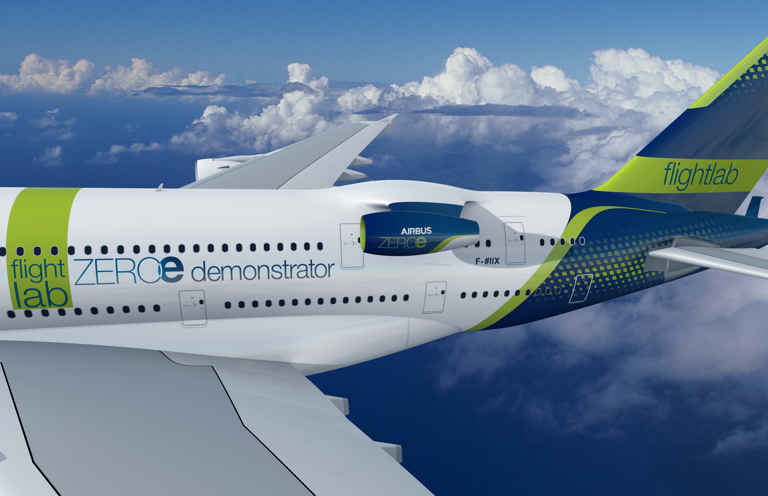|

December 12, 2023
By
Linnea Ahlgren
How Does A Hydrogen Jet Engine Work?

How Does A Hydrogen Jet Engine Work?© Provided
by SimpleFlying
-
Hydrogen has extraordinary
material properties for use in aviation and has a near-zero
impact on the environment, making it a promising candidate for
future aircraft.
-
With three times more energy density than jet
fuel, hydrogen can be used in fuel cells or for direct
combustion in a jet engine.
-
Hydrogen internal combustion engines have a
wide flammability range and high auto-ignition temperature,
making combustion with hydrogen suitable for reducing
pollutants and energy loss.
Hydrogen is one of the most promising candidates for future aircraft.
Whether it
is the use of liquid hydrogen for direct jet engine combustion or
in fuel cells, its material properties are extraordinary for use in
aviation. Moreover, hydrogen has a near-zero impact on the environment
as it does not emit carbon or nitrogen gases into the environment.
Hydrogen has three times more energy density than jet fuel. Unlike the
conventional combustion process, hydrogen fuel cells generate
electricity through an electrochemical process. The
need for continuous electrical power is one of the challenges faced in
hydrogen technology.
This article explores the hydrogen combustion process and how it can
drive down the carbon dioxide and nitrogen oxide emissions in the
environment. While the technology is still in the preliminary phase,
it has been tried and tested by large manufacturers, including Airbus.

Watch on
YouTube
A history of hydrogen combustion
The world's first internal combustion engine, constructed in 1804 by
Franco-Swiss inventor Isaac de Rivaz, used a combination of hydrogen
and oxygen. Tokyo City University has been developing hydrogen
internal combustion engines since 1970, and there are buses that run
on the technology. It has even already been used to power aircraft.
In 1988, the Tupolev Tu-155 took to the skies as the world’s first
experimental commercial aircraft operating on liquid hydrogen. It flew
about 100 test flights powered by hydrogen and later liquefied natural
gas until the collapse of the USSR in 1991. Now, airplane and engine
makers are trying to replicate the task.
Different from hydrogen-electric
A hydrogen internal combustion engine differs from a hydrogen fuel
cell. The fuel cells generate electricity from hydrogen and then use
that electricity in an electric motor, much like an electric vehicle.
Meanwhile, with internal combustion, hydrogen is used the same way as
gasoline or jet fuel. Liquid or gaseous hydrogen is burned in a gas
turbine engine to generate thrust.
Combustion is a chemical process in which energy is released from a
mixture of fuel and air. Proponents of hydrogen say that its wide
flammability range and high auto-ignition temperature make it
particularly suitable for combustion. The former means it can be used
with a lower temperature, creating fewer pollutants, while the latter
means less energy loss.
CFM to supply hydrogen engine for A380
testbed
Last year, Airbus announced that it had signed an agreement with CFM
International, a 50/50 joint company between GE and Safran Aircraft
Engines. The two partners will collaborate on a hydrogen
demonstration program using an A380 centered around internal
combustion. CFM will modify a GE Passport turbofan's combustor, fuel
system, and control system to run on hydrogen.
The test engine will be mounted to the rear of the fuselage, so that
readings on factors like emissions and contrails can be measured
without interference from the other engines powering the plane running
on regular jet fuel.
The program is undertaken as a preparation for Airbus's task to bring
a zero-emissions aircraft to market by 2035. Gaël Méheust, President
and CEO of CFM, said in a statement announcing the partnership,
“Hydrogen combustion capability is one of the foundational
technologies we are developing and maturing as part of the CFM RISE
Program. Bringing together the collective capabilities and
experience of CFM, our parent companies, and Airbus, we really do
have the dream team in place to successfully demonstrate a hydrogen
propulsion system.”
Green Play Ammonia™, Yielder® NFuel Energy.
Spokane, Washington. 99212
509 995 1879
Cell, Pacific Time Zone.
General office:
509-254
6854
4501 East Trent
Ave.
Spokane, WA 99212
|